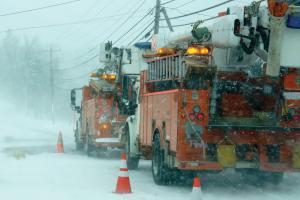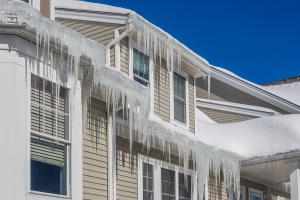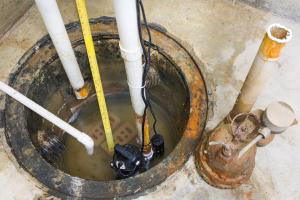8 tips to help winterize your home

In 2021, more than $95 million in property damage was the result of winter weather’s icy touch.
Your home keeps you safe, so consider winterizing your home to return the favor and keep winter-related damage out of reach.
Get proactive when the temperature drops
1. Add weather stripping
By sealing gaps on your doors and windows you can avoid mold, mildew and water damage around your windows and doors.
2. Insulate pipes
Insulating your pipes will help prevent weather damage no matter what season. One in 50 insured homes have a water damage or freezing pipe claim every year, with an average claim for frozen pipes coming in at about $11,098. Make sure you have the right water backup protection in place as well.
3. Ready your roof
FEMA studies show that your roof is the most vulnerable part of your home to weather damage. The buildup of ice dams on your roof in the winter could cause melted snow to spill into your home. Keep the entire roof the same temperature as the eaves (part of the roof that overhangs) by making sure your attic is well ventilated and insulated.
4. Seal air leaks
Sealing air leaks in your home can help reduce energy costs in your home by about 20%. Luckily, there are several steps you can take to check for air leak problem areas and take action to help save money on those pesky leaks.
5. Clean gutters
If your gutters are clogged, the snow and ice will not drain properly when it melts, which can overflow the gutter, or even worse, weigh the gutter down and possibly detach from the house. Consider installing gutter guards in time for next winter as an added layer of protection.
6. Service your heat sources
Whether you have a furnace, boiler and/or chimney, get them serviced once a year to prevent smoke and fire damage. Changing the filter on your furnace prolongs its life and can save you money on your energy bill.
7. Tend to your trees
Branches are more vulnerable to break during the winter, as the wood hardens and becomes more brittle and susceptible to wind damage. In addition, snow and ice can accumulate on trees and branches, increasing the chances of damage to your home.
8. Check or install detectors
With a higher risk of fires in winter, make sure to install smoke and carbon monoxide detectors and check them regularly to make sure they are working properly. Water and heat monitoring devices can help you detect a small issue before it becomes a big problem.
Next steps
The Hanover offers a broad portfolio of insurance solutions to help protect your home during the winter, spring, summer and fall, including protection against equipment breakdown and total account with waiver of deductible in case a tree falls on your home or garage and damages more than one asset. Contact your local insurance agent be sure you have the right protection in place.
Sources:
National Weather Service
Insurance Information Institute
U.S. Department of Energy
Forbes
8 tips to help winterize your home
In 2021, more than $95 million in property damage was the result of winter weather’s icy touch.
Your home keeps you safe, so consider winterizing your home to return the favor and keep winter-related damage out of reach.
Get proactive when the temperature drops
1. Add weather stripping
By sealing gaps on your doors and windows you can avoid mold, mildew and water damage around your windows and doors.
2. Insulate pipes
Insulating your pipes will help prevent weather damage no matter what season. One in 50 insured homes have a water damage or freezing pipe claim every year, with an average claim for frozen pipes coming in at about $11,098. Make sure you have the right water backup protection in place as well.
3. Ready your roof
FEMA studies show that your roof is the most vulnerable part of your home to weather damage. The buildup of ice dams on your roof in the winter could cause melted snow to spill into your home. Keep the entire roof the same temperature as the eaves (part of the roof that overhangs) by making sure your attic is well ventilated and insulated.
4. Seal air leaks
Sealing air leaks in your home can help reduce energy costs in your home by about 20%. Luckily, there are several steps you can take to check for air leak problem areas and take action to help save money on those pesky leaks.
5. Clean gutters
If your gutters are clogged, the snow and ice will not drain properly when it melts, which can overflow the gutter, or even worse, weigh the gutter down and possibly detach from the house. Consider installing gutter guards in time for next winter as an added layer of protection.
6. Service your heat sources
Whether you have a furnace, boiler and/or chimney, get them serviced once a year to prevent smoke and fire damage. Changing the filter on your furnace prolongs its life and can save you money on your energy bill.
7. Tend to your trees
Branches are more vulnerable to break during the winter, as the wood hardens and becomes more brittle and susceptible to wind damage. In addition, snow and ice can accumulate on trees and branches, increasing the chances of damage to your home.
8. Check or install detectors
With a higher risk of fires in winter, make sure to install smoke and carbon monoxide detectors and check them regularly to make sure they are working properly. Water and heat monitoring devices can help you detect a small issue before it becomes a big problem.
Next steps
The Hanover offers a broad portfolio of insurance solutions to help protect your home during the winter, spring, summer and fall, including protection against equipment breakdown and total account with waiver of deductible in case a tree falls on your home or garage and damages more than one asset. Contact your local insurance agent be sure you have the right protection in place.
Sources:
National Weather Service
Insurance Information Institute
U.S. Department of Energy
Forbes
8 tips to help winterize your home
In 2021, more than $95 million in property damage was the result of winter weather’s icy touch.
Your home keeps you safe, so consider winterizing your home to return the favor and keep winter-related damage out of reach.
Get proactive when the temperature drops
1. Add weather stripping
By sealing gaps on your doors and windows you can avoid mold, mildew and water damage around your windows and doors.
2. Insulate pipes
Insulating your pipes will help prevent weather damage no matter what season. One in 50 insured homes have a water damage or freezing pipe claim every year, with an average claim for frozen pipes coming in at about $11,098. Make sure you have the right water backup protection in place as well.
3. Ready your roof
FEMA studies show that your roof is the most vulnerable part of your home to weather damage. The buildup of ice dams on your roof in the winter could cause melted snow to spill into your home. Keep the entire roof the same temperature as the eaves (part of the roof that overhangs) by making sure your attic is well ventilated and insulated.
4. Seal air leaks
Sealing air leaks in your home can help reduce energy costs in your home by about 20%. Luckily, there are several steps you can take to check for air leak problem areas and take action to help save money on those pesky leaks.
5. Clean gutters
If your gutters are clogged, the snow and ice will not drain properly when it melts, which can overflow the gutter, or even worse, weigh the gutter down and possibly detach from the house. Consider installing gutter guards in time for next winter as an added layer of protection.
6. Service your heat sources
Whether you have a furnace, boiler and/or chimney, get them serviced once a year to prevent smoke and fire damage. Changing the filter on your furnace prolongs its life and can save you money on your energy bill.
7. Tend to your trees
Branches are more vulnerable to break during the winter, as the wood hardens and becomes more brittle and susceptible to wind damage. In addition, snow and ice can accumulate on trees and branches, increasing the chances of damage to your home.
8. Check or install detectors
With a higher risk of fires in winter, make sure to install smoke and carbon monoxide detectors and check them regularly to make sure they are working properly. Water and heat monitoring devices can help you detect a small issue before it becomes a big problem.
Next steps
The Hanover offers a broad portfolio of insurance solutions to help protect your home during the winter, spring, summer and fall, including protection against equipment breakdown and total account with waiver of deductible in case a tree falls on your home or garage and damages more than one asset. Contact your local insurance agent be sure you have the right protection in place.
Sources:
National Weather Service
Insurance Information Institute
U.S. Department of Energy
Forbes
8 tips to help winterize your home
In 2021, more than $95 million in property damage was the result of winter weather’s icy touch.
Your home keeps you safe, so consider winterizing your home to return the favor and keep winter-related damage out of reach.
Get proactive when the temperature drops
1. Add weather stripping
By sealing gaps on your doors and windows you can avoid mold, mildew and water damage around your windows and doors.
2. Insulate pipes
Insulating your pipes will help prevent weather damage no matter what season. One in 50 insured homes have a water damage or freezing pipe claim every year, with an average claim for frozen pipes coming in at about $11,098. Make sure you have the right water backup protection in place as well.
3. Ready your roof
FEMA studies show that your roof is the most vulnerable part of your home to weather damage. The buildup of ice dams on your roof in the winter could cause melted snow to spill into your home. Keep the entire roof the same temperature as the eaves (part of the roof that overhangs) by making sure your attic is well ventilated and insulated.
4. Seal air leaks
Sealing air leaks in your home can help reduce energy costs in your home by about 20%. Luckily, there are several steps you can take to check for air leak problem areas and take action to help save money on those pesky leaks.
5. Clean gutters
If your gutters are clogged, the snow and ice will not drain properly when it melts, which can overflow the gutter, or even worse, weigh the gutter down and possibly detach from the house. Consider installing gutter guards in time for next winter as an added layer of protection.
6. Service your heat sources
Whether you have a furnace, boiler and/or chimney, get them serviced once a year to prevent smoke and fire damage. Changing the filter on your furnace prolongs its life and can save you money on your energy bill.
7. Tend to your trees
Branches are more vulnerable to break during the winter, as the wood hardens and becomes more brittle and susceptible to wind damage. In addition, snow and ice can accumulate on trees and branches, increasing the chances of damage to your home.
8. Check or install detectors
With a higher risk of fires in winter, make sure to install smoke and carbon monoxide detectors and check them regularly to make sure they are working properly. Water and heat monitoring devices can help you detect a small issue before it becomes a big problem.
Next steps
The Hanover offers a broad portfolio of insurance solutions to help protect your home during the winter, spring, summer and fall, including protection against equipment breakdown and total account with waiver of deductible in case a tree falls on your home or garage and damages more than one asset. Contact your local insurance agent be sure you have the right protection in place.
Sources:
National Weather Service
Insurance Information Institute
U.S. Department of Energy
Forbes











